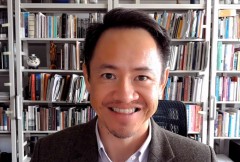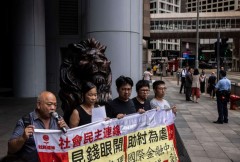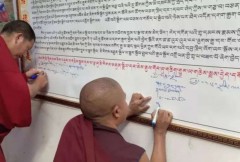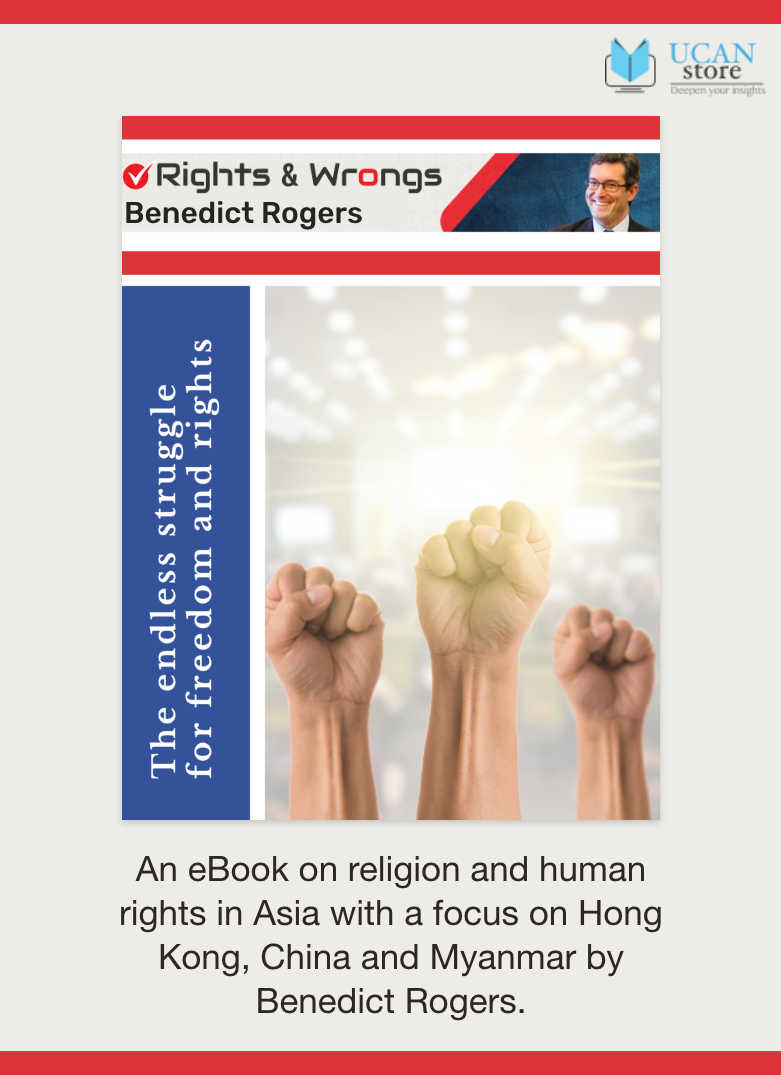
NEWSLETTERS
What’s happening in Asian Church
and what does it mean for the
rest of the world?
Updated: June 07, 2023 06:14 AM GMT
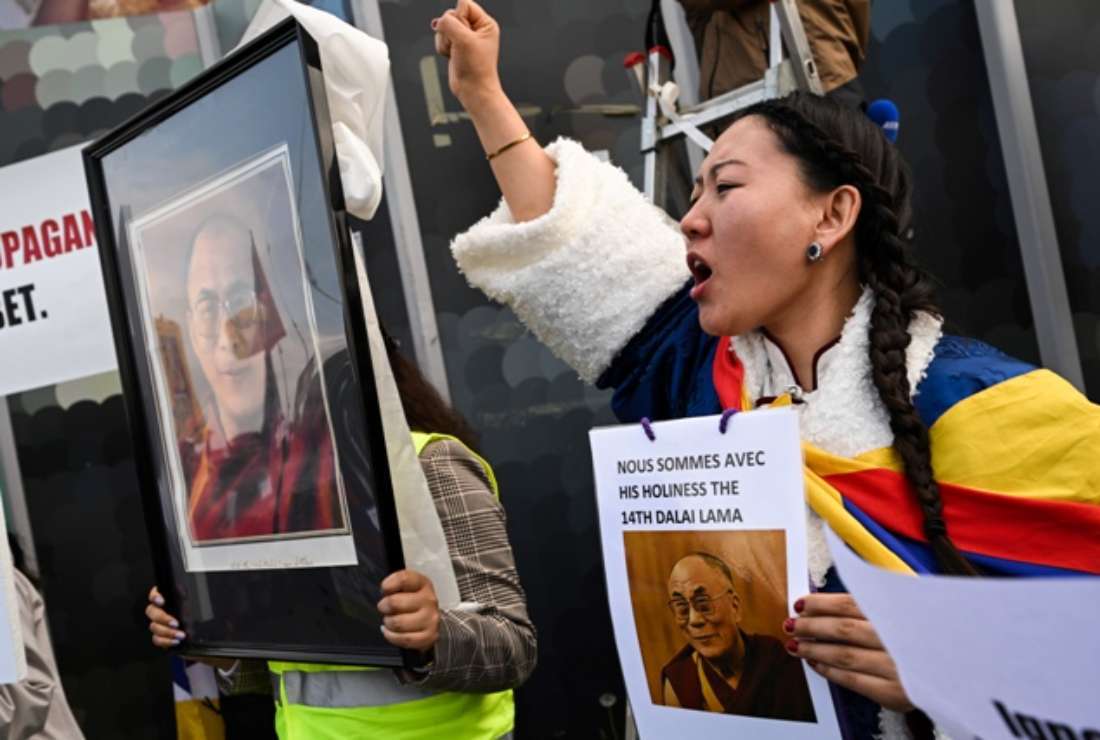
A woman holds a sign reading 'We are with his holiness the 14th Dalai Lama' during a rally in support of Tibetan spiritual leader the Dalai Lama after a video triggered a backlash on social media in which he asks a boy to suck his tongue, in Paris, on April 22. (Photo: AFP)
A private audience with His Holiness the Dalai Lama is not unlike a private audience with the Holy Father.
There is a similar mix of awe, protocol, formality and security as well as spirituality, informality, humanity and humility. There is a similar blend of being ushered in by time-conscious officials eager to protect their principal’s time, followed by the timeless, other-worldly presence of the principal himself.
I have had the great privilege of meeting Pope Francis several times, in private audiences, and then, last month, meeting His Holiness the Dalai Lama. Both men were remarkably similar: generous-spirited, humble and saying much with their eyes but little with their words.
My audience with the Dalai Lama happened to be on the 64th anniversary of his safe arrival in India following his escape from the invasion of Tibet by Mao Zedong’s Chinese Communist Party (CCP) regime and its so-called People’s Liberation Army (PLA).
Meeting this 87-year-old Tibetan Buddhist spiritual leader in his simple residence in McLeod Ganj, in the hills above Dharamshala in northern India will go down as one of the greatest privileges of my life.
As I was ushered in, I did as I had been advised: I wore my face mask and presented him with a Tibetan prayer scarf. As soon as it was in his hands, it was suddenly upon my shoulders: an intimate gesture of spiritual solidarity.
"This is a prime illustration of cultural misunderstanding — and precisely why we should always take a step back"
I then presented him with my new book, The China Nexus: Thirty Years In and Around the Chinese Communist Party’s Tyranny, for which I had interviewed His Holiness a year or so ago. As he received it, his eyes settled on the Tibetan flag on the front cover of the book and lit up. He then had no hesitation in posing for photographs holding the book in his hands.
Not long after my visit, a controversy broke out about His Holiness’ encounter with an Indian boy. I don’t intend to dwell on it, but because it has generated some attention it merits an explanation.
The encounter, for a time, provoked a spiral of commentary on social media. And to an untrained Western eye, with sensitivity to sexual abuse and sensuality, it is understandable that it caused concern. Yet this is a prime illustration of cultural misunderstanding — and precisely why we should always take a step back, take advice, ensure we understand before commenting.
One of my longest and wisest mentors in politics and advocacy has a phrase: “Let us have open eyes, open ears and an open mind, before having an open mouth.” She is right, and never more so than in this instance.
First, the boy approached His Holiness and asked him for a hug.
Second, this was all in front of television cameras.
Third, this was all in front of his mother and other relatives.
In other words, nothing was done in secret.
Then let’s look at the exchange itself. They hugged. Then His Holiness stuck out his tongue.
Undoubtedly to a Western eye, this looks rather odd. But do a little research into Tibetan culture, and you will discover quickly that sticking out your tongue in Tibetan is akin to waving or shaking hands as a greeting in Western culture.
Then His Holiness said words which to a Western, over-sexualized, over-sensualized, over-sensitive culture are profoundly shocking: “Suck my tongue.”
Obviously, to a Western audience, those words are disgusting. But again, put them in context.
"The CCP clearly wanted to embarrass His Holiness at a time when he is particularly prominent"
I am told by Tibetan friends that this phrase — literally “eat my tongue” — means something totally different from how it sounds to a Western ear. It is a sign of generosity and compassion.
Elderly relatives, after they have given sweets to kids, add this phrase as a sign that they want to give the next generation everything. Of course, to a Western ear, it's repellent — but we should be slow to judge and quick to try to understand.
And most importantly, we should know that the CCP regime will be quick to make hay — as they have with this fiasco.
Friends have suggested to me that the CCP had the video footage of His Holiness with this Indian boy for some time and was sitting on it, waiting for the day when it would be opportune to release it.
It can be no coincidence that it was released just before His Holiness was due to attend the International Buddhist Summit in Delhi, and soon after His Holiness met the Mongolian boy named the third most important spiritual leader in Tibetan Buddhism, as well as me and the publisher of my book, Dean Baxendale of Optimum Publishing International.
The CCP clearly wanted to embarrass His Holiness at a time when he is particularly prominent. The video was played widely inside Tibet and China in an effort to discredit His Holiness.
However, the CCP’s propaganda effort rather backfired. His Holiness not only attended the summit but addressed it on the last day, and Tibetans inside Tibet were simply delighted to see usually banned images of His Holiness freely.
For the truth is, while Beijing wants to perpetrate the narrative about the Dalai Lama sucking tongues, it’s a smokescreen for the regime’s atrocities across Tibet for over seven decades.
For 73 years Tibet has been Beijing’s laboratory for practices of torture and surveillance and policies of cultural genocide and Sinicization, which it has then applied elsewhere.
The "Sikyong" or prime minister of the Tibetan government-in-exile, Penpa Tsering — who was in London last week — recently told the US Congress that Tibet is dying a “slow death” under Chinese occupation. If you want to understand the mentality of the Chinese regime, study Tibet.
Over the past year or so, reports have emerged of a new, deeply sinister assimilationist policy inflicted on Tibet — the separation of a million children from their families, without the free consent of their parents. Placed in colonial boarding schools, children aged between six and 18 are indoctrinated in Chinese language, prohibited from practicing Tibetan culture and subjected to a curriculum of political propaganda designed to make them identify as Chinese and as loyal to the CCP. This has impacted almost 80 percent of Tibet’s young people today.
According to a Tibetan researcher I met in Dharamshala, this new policy is the third stage in China’s Sinicization of Tibet.
"The CCP is a regime conditioned to commit atrocity crimes and it must be called to account"
The first stage involved the Chinese regime grooming Tibetans as their proxies after the invasion and occupation of Tibet, and the second was the establishment of boarding schools across mainland China in the 1980s to prepare Tibetan students for a career as the colonizers’ quislings. Those classes involved Chinese language, ideology, and “patriotic education,” training Tibetans to become Chinese and to implement the colonial rulers’ policies in Tibet.
Today’s boarding schools are an extension of this policy, and a model of Beijing’s Sinicization campaign that is replicated, with variations, in Xinjiang, Hong Kong and beyond. Xi Jinping’s goal is tianxia, “one world under Heaven” — a euphemism for CCP world dominance.
Confucius Institutes, Huawei, Hikvision, TikTok and China’s other global institutions and conglomerates, as well as Beijing’s influence in multinational organizations such as the United Nations and the World Health Organization, are variations on the theme. The regime’s United Front Work Department coordinates all these efforts, to infiltrate, intimidate and influence. The tentacles stretch worldwide, from Lhasa to London, from Kashgar to Kathmandu and from Beijing to Berlin.
So what do we do about it?
First, recover our priorities. What happens in Tibet happens elsewhere in all territories under the CCP’s rule, in various ways and forms. The CCP is a regime conditioned to commit atrocity crimes and it must be called to account.
Second, don’t be distracted. Of course, headlines about the Dalai Lama asking a young boy to “suck my tongue” are disgusting, disconcerting and destabilizing. But take time to understand the full context and picture — and don’t allow the CCP’s propaganda machine to succeed.
And third, let’s promote accountability. China’s invasion of Tibet was illegal, its occupation is unjustified and its atrocity crimes are criminal. Beijing must be held to account. If there is ever to be any compromise between Beijing and Tibet, Xi Jinping must meet His Holiness, the Panchen Lama must be freed and the practice of Tibetan Buddhist culture and religion must be practiced without restriction.
Until those goals are met, I will go on speaking for Tibet, for the Dalai Lama, the Panchen Lama and everyone else who is repressed in Tibet, until the day comes when Tibetans are free to choose their destiny. Meeting His Holiness and the Sikyong and other Tibetans in Dharamsala inspired me to redouble my efforts.
*The views expressed in this article are those of the author and do not necessarily reflect the official editorial position of UCA News.
Help keep UCA News independent
The Church in Asia needs objective and independent journalism to speak the truth about the Church and the state. With a network of professionally qualified journalists and editors across Asia, UCA News is just about meeting that need. But professionalism does not come cheap. We depend on you, our readers, to help maintain our independence and seek that truth. A small donation of US$2 a month would make a big difference in our quest to achieve our goal.






